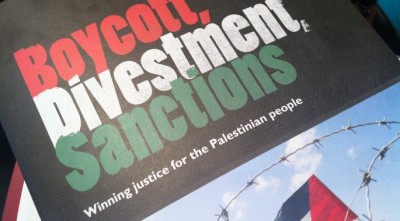Queen’s Speech: UK to Ban Boycott Campaigns Against Israeli Occupation and for the Rights of Palestinians
The controversial bill has been opposed by dozens of British rights groups who campaign against Israeli occupation and for the rights of Palestinians

All Global Research articles can be read in 51 languages by activating the “Translate Website” drop down menu on the top banner of our home page (Desktop version).
To receive Global Research’s Daily Newsletter (selected articles), click here.
Visit and follow us on Instagram, Twitter and Facebook. Feel free to repost and share widely Global Research articles.
***
The UK government announced plans on Tuesday to ban local councils and other public bodies from participating in boycott and divestment campaigns, dealing a heavy blow to supporters of Palestinian rights in Britain.
The announcement was made during the Queen’s Speech opening of Parliament, where Prince Charles said the government will introduce “legislation [that] will prevent public bodies engaging in boycotts that undermine community cohesion”.
UK civil society groups called on the UK government last month to halt the legislation that would limit the right to support causes such as Palestinian rights and climate and social justice through boycott campaigns.
The 46 UK-based groups said in a statement they oppose plans by the government to table an “anti-boycott” bill, saying it presents a “threat to freedom of expression, and the ability of public bodies and democratic institutions to spend, invest and trade ethically in line with international law and human rights”.
The law would prohibit public bodies from imposing boycotts or divestment campaigns against foreign countries, including those who boycott, divest or sanction Israel.
Attack on free speech
The bill comes in the wake of the UK’s wide-ranging application of sanctions, divestment and boycotts against Russian businesses and cultural programmes in the wake of the Russian invasion of Ukraine.
Yasmine Ahmed, UK Director of Human Rights Watch, said
: “Any anti-boycott laws are likely to stop public sector bodies from doing the right thing and disentangling themselves from human rights abuses.”
“Whether it’s in China, Myanmar, Israel or Russia, the UK Government should be banning public sector bodies from making investments that contribute to rights abuses and international crimes,” Ahmed said in a statement.
“Instead, it is making it harder for them to make informed decisions and subjecting them to the whims of the Government”
Pro-Palestinian groups in Britain condemned the proposed bill and said they would campaign to stop it from taking place.
The Palestine Solidarity Campaign (PSC) said it will demonstrate against the proposed bill and described it as an attack on free speech.
Friends of Al Aqsa (FOA) also condemned the proposed bill and echoed PSC concerns that it will harm free speech in Britain.
“In a free society, public bodies must have the right to make ethical choices,” FOA said on Twitter.
Meanwhile, the Conservative Friends of Israel, a pro-Israeli group within the ruling Conservative Party, welcomed the proposed bill.
“We welcome the government’s commitment to legislating against divisive BDS actions which have for too long harmed community relations here at home and the prospect of peace between Israel and the Palestinians,” a spokesperson for CFOI said in a statement.
*
Note to readers: Please click the share buttons above or below. Follow us on Instagram, Twitter and Facebook. Feel free to repost and share widely Global Research articles.

